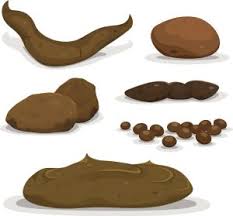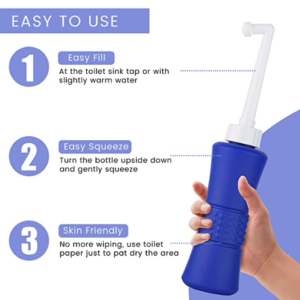
Portable Bidets
We all need to, but we don’t talk about it!
This article suggests how to help elderly people maintain good bowel health and the benefits of portable bidets.
It’s something we all do and yet it’s a very personal subject. One we don’t tend to discuss. I am talking about “Having a bowel movement” Having a poo”, “Taking a dump”, “Emptying your bowel” – or as someone once termed it “Turning the bike around”!
Sadly this sensitive activity is essential because if you don’t empty your bowel you die! The colon becomes dangerously distended which is known as a “megacolon”. The faeces can become hard and impacted and the bowl can rupture. Also, if someone does not go to the toilet when the brain detects the urge the messaging between the bowel and brain switches off.
No urge, no poo, big trouble.
A good diet of healthy fresh fruit and vegetables is essential to maintain a good fibre intake. Other good sources are grains, seeds and nuts. With food prices soaring many people will resort to lower-fibre foods resulting in increased constipation. Don’t forget store-cupboard essentials like kidney beans and baked beans are also a good source and more affordable.
It is also really important to make sure you drink enough fluids. Water is best but tea, coffee and juices also count towards fluid intake. Tea and coffee however contain ingredients that make you need to pee more often and juices tend to be full of sugar.
If you are caring for someone who doesn’t like drinking water, and lots of elderly people don’t, they can eat it! Many foods contain high proportions of water.
Ten top water-filled foods
- Cucumber contains 95% water
- Tomatoes 95%
- Spinach 93%
- Mushrooms 92%
- Yellow melon 91%
- Broccoli 90%
- Brussel sprouts 86%
- Oranges 86%
- Apples 86%
- Blueberries 85%
Back to the subject in hand!
For anyone in a caring role this is part and parcel of it and par for the course. I have known carers to refer to themselves as “bottom wipers!”
I have been thinking about this recently ( as you do ) and it’s prompted me to write this post. How does it feel to have your bottom wiped? Apart from the humiliation and embarrassment of needing to allow someone to do this for you, how does it feel physically? I know when I have done this for people they have said it has hurt or been uncomfortable despite me being as gentle as possible, yet effective.
They may have haemorrhoids or their bottom might be sore from wiping. I used to laugh as my Mother in Law when she said she could only use Andrex(other brands do work) loo paper others made her bottom sore. As I get older I now understand!
Bidet Bliss
A recent trip to Turkey encouraged me to make ample use of the bidet button and what a revelation! As someone said online “If birds mess landed on you you wouldn’t just wipe it with paper”. The bidet meant little or no wiping was needed and reduced the risk of soreness. I missed this back home.
So, I decided to buy a portable bidet. (If you shop on Amazon having used this link I earn 5% of what you spend. This costs you nothing but helps to pay for my costs to host this blog, so thank you)
Basically a soft water bottle with an angled spout. It is nowhere near as powerful as a proper toilet bidet, but it does work. It lead me to think that they could be used in care homes, maybe they already are. I understand that for someone with dementia, this would not be good as the water would scare them. It would also mean the person would not have to stand or be hoisted for so long, which again a positive.

This article is me thinking out loud, and I would welcome your thoughts.
Also, why are toilet bowls oval and commode pots round?

